When they were seated in the wagon, and had fairly commenced their ride, Marco asked Forester, what he meant last evening by a grass farm. “You told me,” said he, “that you wanted me to see a great grass farm.”
“Yes,” replied Forester. “The farms in this part of the United States may be called grass farms. This is the grass country.”
“Isn’t it all grass country?” asked Marco. “Grass grows everywhere.”
“Grass is not cultivated everywhere so much as it is among the mountains, in the northern states,” replied Forester. “The great articles of cultivation in the United States are grass, grain, and cotton. The grass is cultivated in the northern states, the grain in the middle states, and the cotton in the southern states. The grass is food for beasts, the grain is food for man, and the cotton is for clothing. These different kinds of cultivation are not indeed exclusive in the different districts. Some grass is raised in the middle and southern states, and some grain is raised in the northern states; but, in general, the great agricultural production of the northern states is grass, and these farms among the mountains in Vermont are grass farms.
“There is one striking difference,” continued Forester, “between the grass farms of the north, and the grain farms of the middle states, or the cotton plantations of the south. The grass cultivation brings with it a vast variety of occupations and processes on the farm, making the farm a little world by itself; whereas the grain and the cotton cultivation are far more simple, and require much less judgment and skill. This is rather remarkable; for one would think that raising food for beasts would require less skill than raising food or clothes for man.”
“I should have thought so,” said Marco.
“The reason for the difference is,” replied Forester, “that in raising food for animals, it is necessary to keep the animals to eat it, on the spot, for it will not bear transportation.”
“Why not?” said Marco.
“Because it is so cheap,” replied Forester.
“I don’t think that is any reason,” replied Marco.




